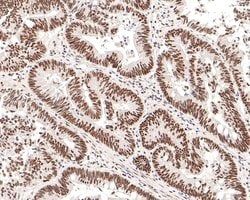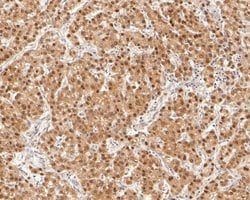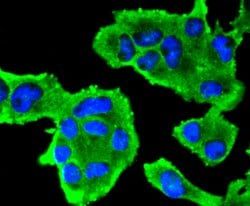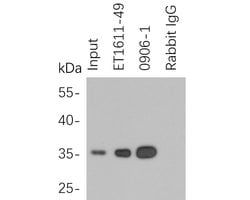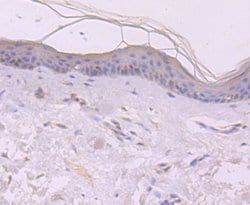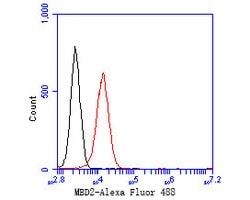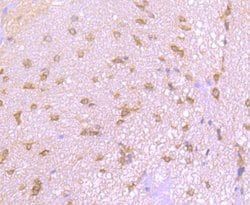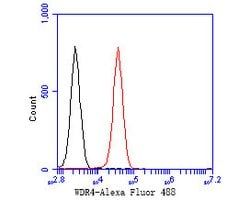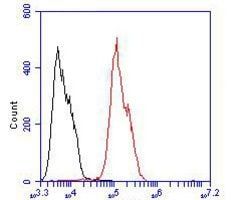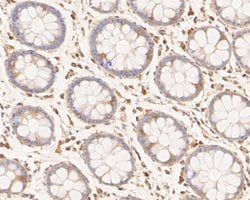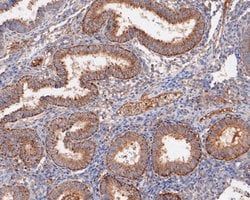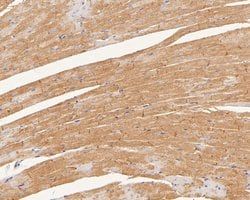ICAD Recombinant Rabbit Monoclonal Antibody (JE49-23), Invitrogen™
Manufacturer: Thermo Scientific
Select a Size
| Pack Size | SKU | Availability | Price |
|---|---|---|---|
| Each of 1 | PIMA542485-Each-of-1 | In Stock | ₹ 45,790.50 |
PIMA542485 - Each of 1
In Stock
Quantity
1
Base Price: ₹ 45,790.50
GST (18%): ₹ 8,242.29
Total Price: ₹ 54,032.79
Antigen
ICAD
Classification
Recombinant Monoclonal
Concentration
1 mg/mL
Formulation
TBS with 40% glycerol and 0.05% sodium azide; pH 7.4
Gene Accession No.
O00273
Gene Symbols
DFFA
Immunogen
Recombinant protein within human ICAD aa 37-137
Quantity
100 μL
Primary or Secondary
Primary
Target Species
Human
Product Type
Antibody
Isotype
IgG
Applications
Flow Cytometry, Immunohistochemistry (Paraffin), Western Blot
Clone
JE49-23
Conjugate
Unconjugated
Gene
DFFA
Gene Alias
A330085O09Rik; DFF; DFF1; DFF35; Dff45; DFF-45; Dffa; DNA fragmentation factor 45 kDa subunit; DNA fragmentation factor subunit alpha; DNA fragmentation factor, 45kDa, alpha polypeptide; DNA fragmentation factor, alpha subunit; H13; ICAD; ICAD-L; ICAD-S; Inhibitor of CAD; RP23-121D17.3
Host Species
Rabbit
Purification Method
Protein A
Regulatory Status
RUO
Gene ID (Entrez)
1676
Content And Storage
Store at 4°C short term. For long term storage, store at -20°C, avoiding freeze/thaw cycles.
Form
Liquid
Description
- Positive Control: Jurkat cell lysate, human stomach tissue lysate, human thyroid tissue, human breast tissue, human small intestine tissue, human pancreas intestine tissue, HCT116
- Subcellular Location: Cytoplasm
- ICAD is the inhibitor of caspase-3-activated DNase which is a substrate that controls nuclear apoptosis
- ICAD has two isoforms: a functional isoform of 45kDa, ICAD-L/DNA fragmentation factor (DFF) 45; and a 35kDa isoform, ICAD-S/DFF35
- Although both ICAD-L and ICAD-S can bind and inhibit CAD, only ICAD-L was reported to be functional
- ICAD is cleaved to be inactivated and allow caspase-activated DNase (CAD) to execute nuclear internucleosomal apoptotic DNA fragmentation
- In non-apoptotic cells, CAD is complexed with its inhibitor, ICAD
- The activation of the CAD/ICAD complex occurs through the caspase 3-mediated cleavage of ICAD at residues 117 and 224, which results in three ICAD fragments that are then released from CAD
- In addition to its DNase inhibitory activity, ICAD acts as a CAD specific folding chaperone
- There are recent reports that ICAD is a potential target for restoring a normal apoptotic signal transduction pathway in colon and brain cancer cells
- Two alternatively spliced transcript variants encoding distinct isoforms have been found for the ICAD gene.
